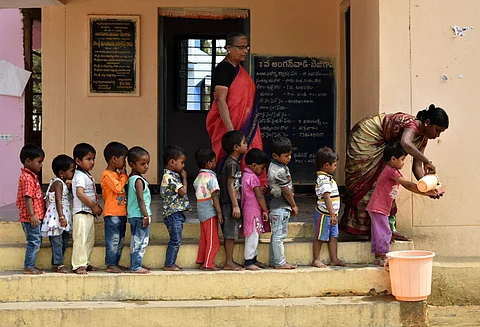

A study conducted by the Karnataka State Rural Development and Panchayat Raj University, Gadag, on the impact assessment on providing supplementary nutrition under Mid-Day Meal Scheme in Yadgir district has revealed that weight gain was noted in children in Yadgir district of Kalyana Karnataka Region compared to Gadag district, where, there is no provision of providing egg or banana to school-going children studying in Classes I to VIII.
The government introduced boiled egg or banana for children studying in Classes I to VIII in six districts of the Kalyana Karnataka Region including Bidar, Kalaburagi, Yadgir, Raichur, Koppal and undivided Ballari district plus Vijayapur and Bagalkot of Belagavi region to increase the nutrition level among the children from December 1 last year.
The government took up this task as it was found that the nutrition level among school-going children was less in the eight districts of Kalyana Karnataka and two districts of Belagavi region compared to other districts of the state.
The Education Department entrusted the task of conducting a study on the impact assessment of providing supplementary nutrition (egg or banana) under Mid-Day Meals scheme to the Karnataka State Rural Development and Panchayat Raj University (KSRDPRU), Gadag.
Going about the study
The university decided to select Yadgir district, which is the most backward district, as the intervention district and Gadag as the control district.
The study was conducted for 100 days and the university submitted its draft report to the government recently, sources in the education department told Express on Tuesday, May 24.
The university constituted an expert committee of 12 members which was headed by Registrar of the university, Prof Basavaraj Lakkannavar, Public Health Consultant and Hon Prof of KSRDPRU Dr Suresh Rao as the project head and Girish Dixit as the team leader.
The team selected 30 schools in Yadgir and Gadag districts each for the study by cluster sampling technique. As many as 3,029 students of Yadgir district and 3,325 students of Gadag district were selected for the baseline study and 2,190 students of Yadgir district and 2,469 students of Gadag district were selected for the endline study which was held for 100 days.
Anthropometry of all the children studying in Classes I to VIII in the selected schools of Yadgir and Gadag districts were considered under the study. As part of the study, height and weight of the children and their body mass was calculated during baseline and endline studies.
Here are the recommendations
According to sources in the education department, the draft report submitted by KSRDPRU has found weight gain and improvement in health conditions in the intervention district (Yadgir) is more compared to control district Gadag which is an encouraging output of intervention in Mid-Day Meals scheme.
Considering this, the study has recommended the continuation of providing eggs or bananas to the children studying in the school. It has also recommended extending the facility to the children studying in Classes IX and X.
More than 90 per cent of children consume eggs and there are no organised complaints about egg supplementation as it is replaced by banana, the study says. It has also mentioned that participation of children in sports and physical education has improved in Yadgir.
School registration and attendance has improved across Yadgir district, daily compliance is also better, but attendance is higher on egg days. The team has recommended the continuation of this intervention for at least one year with a minimum of 100 eggs so that improvement in scholastic performance and cognitive ability of the children can be assessed.
